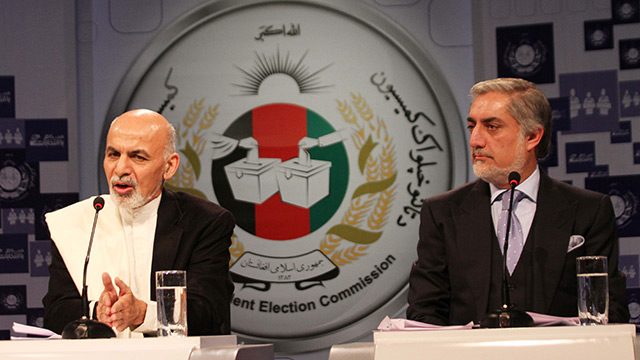SUMMARY
This is AI generated summarization, which may have errors. For context, always refer to the full article.

KABUL, Afghanistan – Afghanistan’s feuding presidential rivals may have struck a breakthrough deal to try and solve their fraud-tainted elections, but analysts warn the war-weary nation still has a long way to go to avoid political chaos.
Both Ashraf Ghani and Abdullah Abdullah signed an agreement Friday to form a national unity government in a deal overseen by US Secretary of State John Kerry, opening an apparent way forward after weeks of dispute.
The feud had threatened to derail the country’s first peaceful democratic transfer of power and revive ethnic conflict as US-led NATO troops withdraw after more than a decade.
Under the terms of the newly signed agreement — which Kerry brokered in July — Abdullah and Ghani reaffirmed their earlier commitment to an audit of all 8.1 million votes cast during the second round of voting.
A national unity government will undertake a comprehensive political reform program, while a new “chief executive” position will be created by presidential decree and held by a member of whoever’s camp is declared the runner up.
‘A long way to go’
The deal caused sighs of relief among those negotiators charged with trying to find a way through the current political impasse, but many analysts remain skeptical.
“We have a long way to go to come up with a package on national unity. We took just one step yesterday,” Abdul Waheed Wafa, director of Afghanistan Centre at Kabul University, told AFP.
Wafa said it is the details that have yet to be hammered out, rather than those that have been agreed upon, which could cause future headaches.
“For instance, the authority of chief executive position is unclear,” he said.
Ali Mohammad Ali, deputy director of the Afghan Institute for Strategic Studies, is even less sanguine.
“The problem with both candidates is that they have agreed on general basis of a framework on the principles, but not on the details,” he said.
“I don’t see the future of this unity government. It would be a weak government. I don’t think it’s going to work.”
Both analysts cited concerns that having the runner-up working within the government could lead to blockages, with the eventual winner reluctant to share power.
But Ghani and Abdullah have struck optimistic notes since the deal was announced.
“We are positive and optimistic,” said Ashraf Ghani’s spokesman Faizullah Zaki.
“The declaration signed by both sides yesterday has paved the ground for a more positive future, a future in which both election teams will work together to form a strong national unity government.”
However, Afghanistan’s political system meant that the new chief executive’s powers will be determined by the president, said Zaki.
Afghanistan entering ‘a new phase’
In a interview with Agence France-Presse Saturday, August 9, Abdullah said his country was entering “a new phase”, stressing that the vote audit must be completed in time to have a new president before a NATO summit in Britain on September 4-5 — a key demand of the US.
“The success of the political framework will depend on the sincerity of both sides,” he said.
The summit is scheduled to endorse a US-led NATO “training and advisory” mission in Afghanistan next year after all foreign combat troops withdraw by December.
But Abdullah cautioned that his supporters would only accept the result if the audit was “legitimate”, raising concerns of future disagreements between the two camps.
“If our people, our supporters are convinced about the legitimacy of the process they will accept it the same that I will accept it,” he said.
Without an end to the political impasse, Afghanistan faces an uncertain future.
NATO members have expressed reluctance to make costly commitments if Afghanistan fails to complete its first democratic transfer of power — a key goal of the massive international military and aid effort since 2001.
Taliban insurgents have launched new operations in the south and east in recent months, and violence is increasing across the country, according to several independent reports.
US-led foreign troop numbers have declined from a peak of 150,000 in 2012 to just 44,300 now, and NATO combat operations are winding down fast after 13 years of fighting that have failed to defeat the Taliban. – Rappler.com
Add a comment
How does this make you feel?
There are no comments yet. Add your comment to start the conversation.